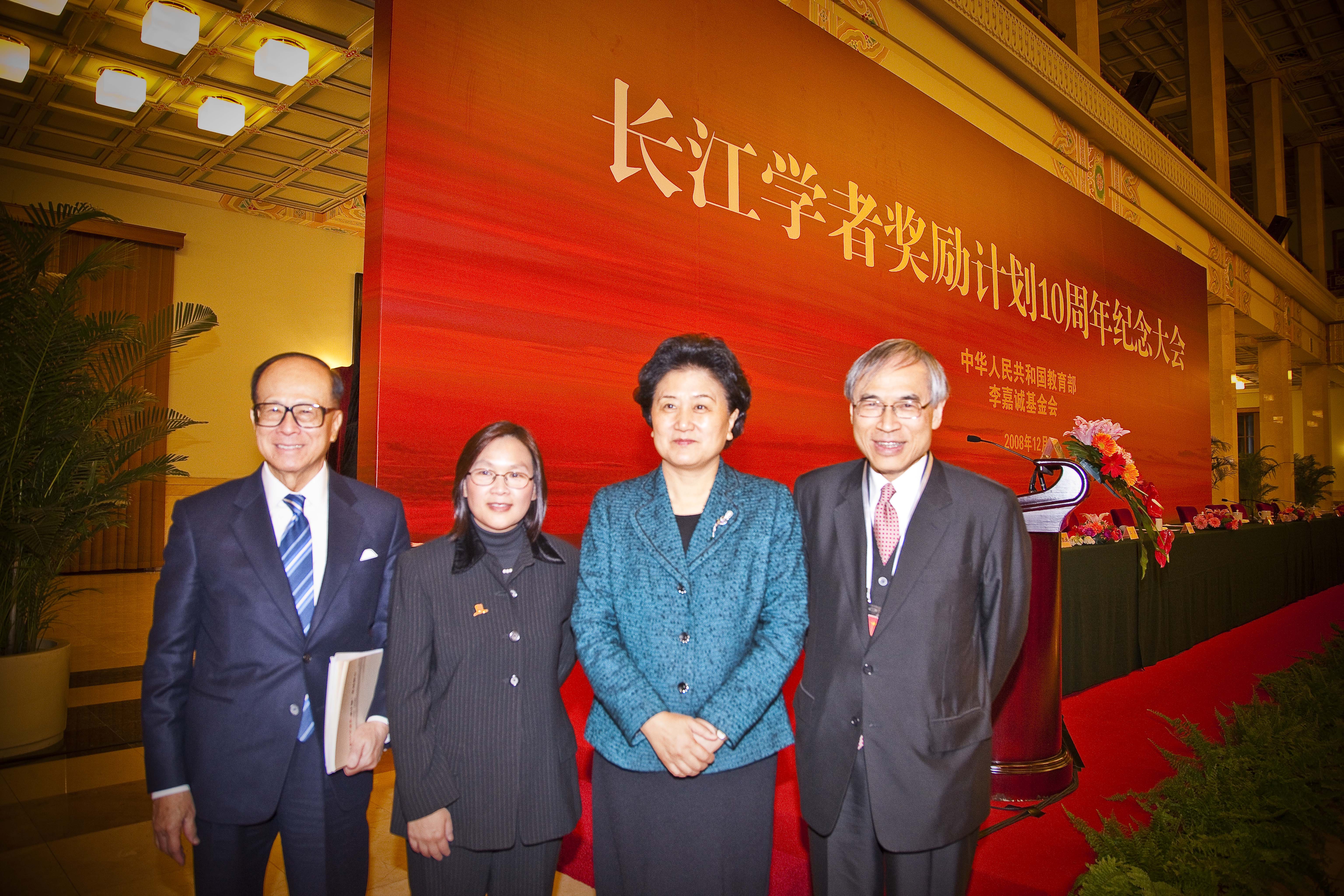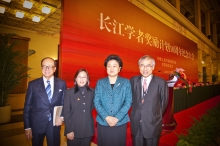CUHK
News Centre
CUHK Scholars Win Coveted Award for Three Consecutive YearsProfessor Chan Hsiao-chang Bestowed Cheung Kong Achievement Award
Professor Chan Hsiao-chang, Li Ka Shing Professor of Physiology and director of the Epithelial Cell Biology Research Centre at The Chinese University of Hong Kong (CUHK), was bestowed the Life Sciences Award of the 2007 Cheung Kong Achievement Award today (5 December). The presentation ceremony took place at the Great Hall of the People in Beijing.
Professor Chan Hsiao-chang was the only recipient of the Cheung Kong Awards from Hong Kong. Together with Professor Joseph Sung Jao-yiu, head of Shaw College and chair professor of the Department of Medicine and Therapeutics, and Professor Dennis Lo Yuk-ming, professor of chemical pathology and Li Ka Shing Professor of Medicine, CUHK scholars have won this prestigious award for three consecutive years. CUHK is the only university in Hong Kong with award recipients on its staff.
The Cheung Kong Scholars Programme was jointly established in 1998 by the Ministry of Education and the Li Ka Shing Foundation to enhance the competitiveness of China’s higher education sector, groom outstanding talent and promote the country’s development. Beginning in 2005, the award has expanded beyond mainland China to include tertiary institutions in Hong Kong and Macau, as well as research institutions under the Chinese Academy of Sciences. The Cheung Kong Achievement Award honours outstanding Chinese scientists under the age of 50 who have a high standard of scientific ethnics and have attained important breakthroughs or internationally recognized achievements in the natural sciences.
Winners of the Cheung Kong Achievement Award were selected under a stringent screening procedure. The Ministry of Education invited academicians of the Chinese Academy of Sciences and the Chinese Academy of Engineering, as well as renowned scholars in the humanities and the social sciences to evaluate the academic achievement of the candidates and an expert panel appointed by Cheung Kong Scholars conducted a final evaluation of the shortlisted candidates. The three winners of this year are: Professor Chan Hsiao-chang of CUHK who was awarded the Life Sciences Award, Professor Ma Jun of Harbin Institute of Technology who was awarded the Engineering Sciences Award, and Professor Jiang Guibin of the Research Center for Eco-Environmental Sciences, Chinese Academy of Sciences who was bestowed the Environmental Sciences Award. Each prize carries a monetary award of RMB 1 million, donated by the Li Ka Shing Foundation.
Professor Chan Hsiao-chang is a leading authority in epithelial cell-related multidisciplinary research and has contributed significantly to a number of important discoveries, including a cell shrinkage-activated cation channel (Science, 1992) and a novel defensin molecule in the epididymis for sperm maturation (Science, 2001, Nature Cell Biology, 2004). Another groundbreaking study revealing the role of cystic fibrosis transmembrane conductance regulator (CFTR) in female fertility and infertility by Professor Chan was published in Nature Cell Biology in 2003, and was also featured by Nature China as one of the best research from Hong Kong and mainland China. These discoveries not only shed light on how epithelial secretions affect our bodily functions, particularly reproduction, but also provide lead to the development of new strategies for diagnosis and treatment of infertility, and for contraception.
Professor Chan’s contributions to epithelial cell biology have brought her a number of awards including the National Natural Sciences Award of China in 1997, Distinguished Young Investigator Award by the National Natural Science Foundation of China in 2000, and the 2007-08 Senior Research Fellowship of The Croucher Foundation.
Professor Chan obtained her B.S. degree in Bioengineering (1983) and Ph.D. degree in Biophysics (1988) from the University of Illinois, Urbana-Champaign. She worked at the University of Chicago as a postdoctoral fellow before she took up a faculty position as Assistant Professor at The Chinese University of Hong Kong in 1993. She was promoted to Professor of Physiology in 2006. She sits on numerous editorial boards and also holds visiting professorship at over 14 universities or institutes in Mainland China. Professor Chan has also been invited to review grants for a number of funding agencies worldwide, including WHO, Wellcome Trust (UK), German Cystic Fibrosis Association, Italian Telethon Foundation, National Natural Science Foundation of China, National Science Foundation (USA).
Professor Chan remarked, “I am very pleased with receiving the award, but believe the honour belongs as much to myself as to all the staff and students of the Epithelial Cell Biology Research Centre and our many research collaborators.”
The Cheung Kong Scholars Programme attracts intellectual elite to teach and conduct research at higher education institutions on the mainland through appointments of professors and lecturers. Those appointed have included many outstanding scholars from Hong Kong and overseas. For the year of 2007, 107 professors and 95 lecturers were selected and appointed. Specializing in intelligent computing, Professor Wang Jun of the Department of Mechanical and Automation Engineering at CUHK, was among one of the scholars appointed lecturer at Shanghai Jiao Tong University.
From 1998 to 2008, 17 outstanding scholars had won the Cheung Kong Achievement Award. 905 professors and 403 lecturers had been appointed at 115 higher education institutions in eight batches with the following profiles at appointment: 98% had PhDs; over 90% had overseas experience; average age was 42 for professors and 46 for lecturers, youngest was 30. Among the professors, 259 were from overseas or had returned to China from overseas in the last three years, while all lecturers appointed had come from Hong Kong or overseas.



